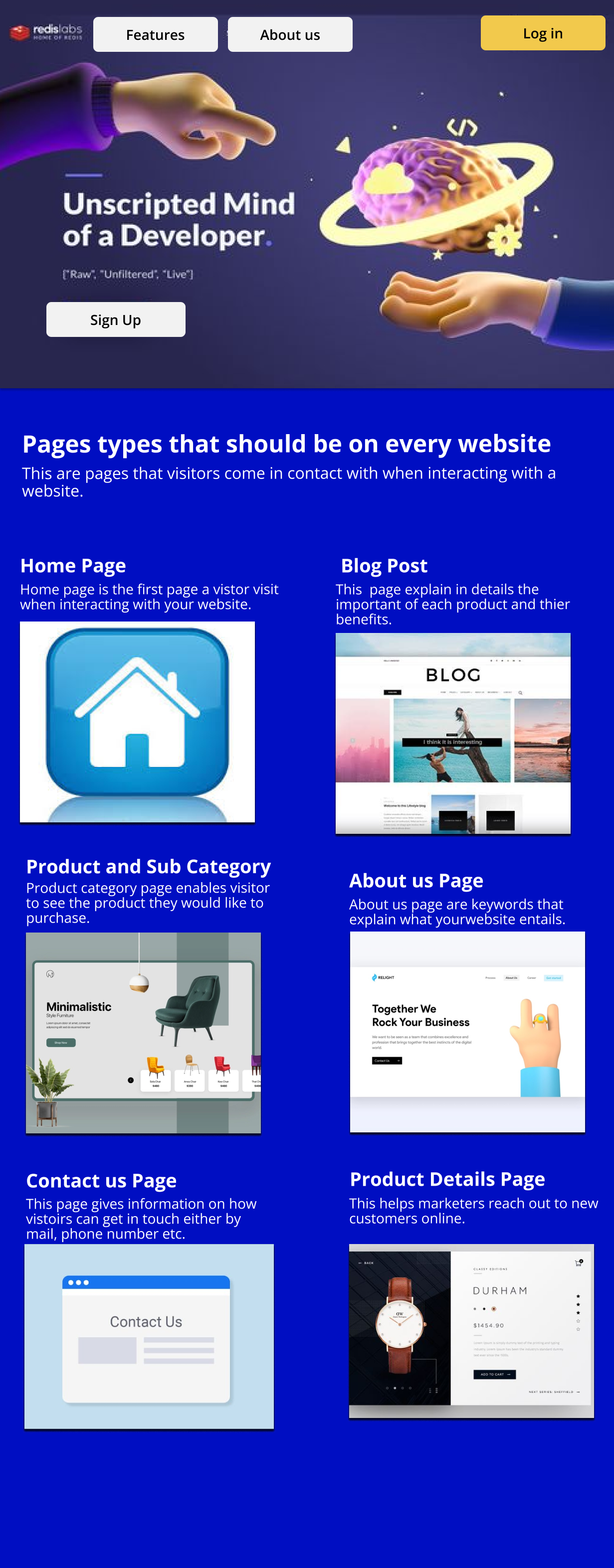 It is possible for an SEO to determine which page is the most beneficial in terms of search engine optimization efforts. In this article, we’ll go through some of the most important page types that every website should have.
It is possible for an SEO to determine which page is the most beneficial in terms of search engine optimization efforts. In this article, we’ll go through some of the most important page types that every website should have.
- About Us
- Home Page
- Product Category & Sub-Categories
- Contact Us Page
- Blog Posts
- Product Details Pages
About Us
The ‘About us’ page has been shown to have a major impact on website conversion time and time again. Visitors who are willing to shell out money for a service are likely to look at the About Us page at least once. For both traffic generation and conversion, the page is critical. Although optimizing the “about us” page may seem unusual, there are several keywords that can be used for this purpose. Optimizing the “about us” section of your website to include keywords relating to your products or services is possible.
Home Page
The story of a website begins with its home page. It gives a general idea of what the site is about. Because it is the first page a visitor sees when visiting a website, the home page tends to be the most popular. The homepage should live up to users’ expectations as the most important page on a website.
In order to attract visitors to your website, you should create a homepage that outlines all of its features. An overview of your company’s products, services and clients as well as the benefits of doing business with you should be included. You might think of your home page as the entry point to your website. Once on the website, the visitor can explore the various sections at their leisure. To make a lasting impression, make sure your homepage is interesting, useful, and clear of unnecessary distractions.
Product Category & Sub-Categories
Category and subcategory page optimization can open up a multitude of SEO opportunities for product-based businesses. Using the category and subcategory pages on your website, customers may get a clear picture of the things you sell and the options they have for making purchases. These pages are only tough because of their content. Page optimization necessitates content, yet the product list gets pushed to the bottom of the page as a result. Customers get annoyed since they have to scroll down a lot, something they don’t want to do.
Contact Us Page
Visitors are directed to your contact page if they wish to get in touch with you. In addition to email, a query form, phone numbers, and a WhatsApp number, users can also find information on how to get in touch(s). Businesses located close to their target audience are more likely to generate interest from them.
When it comes to improving the contact us page, there are a slew of things to keep in mind. Find out what people are searching for when they’re trying to find your business. On your contact page, include a map of your location. Make it easy for visitors to get in touch with you by including multiple ways for them to reach you in your address and phone number.
Blog Posts
Having too many pages on a website might have a negative effect on the user’s experience. It also has an effect on conversion. A blog could come in handy in this situation. There is no limit to the number of blogs you can add to your website. Multiple options are presented by the website’s blogs.
To begin with, it allows you to provide material that can’t be fully covered on traditional landing pages. Two, it gives you the ability to develop data that is specific to the searcher’s needs. Third, you may use it to improve your blog’s content in order to see an increase in both organic ranking and traffic.
Product Details Pages
In order to finish the purchasing process, buyers must first visit the product details page. This is where they keep track of all the products that are currently on the market. A customer’s purchasing cart is now full of things that have been well researched. There isn’t much area for material on product pages, making it tough to optimize them. Text blocks with keyword-rich content cannot be added to this site in the same way they may be.
It’s better to focus on improving the product detail page’s tags, such as title, description, alt, and headers, rather than dumping more content there. Websites with dynamic keyword placement can also be optimized. Search engine marketers may recommend using boilerplate content for a certain industry. My advice to you is to steer clear of this behavior.
